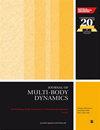基于比例导数分散输出的自适应双足机器人控制器
IF 1.9
4区 工程技术
Q3 ENGINEERING, MECHANICAL
Proceedings of the Institution of Mechanical Engineers Part K-Journal of Multi-Body Dynamics
Pub Date : 2022-09-15
DOI:10.1177/14644193221125093
引用次数: 0
摘要
本文描述了一种新的自适应控制方法的设计和实现,以跟踪一组生物灵感参考轨迹。这些参考定义了外骨骼机器人的拟人化运动。该控制器实现了对状态反馈(比例导数型)结构的可变增益的调节律。利用可控李雅普诺夫函数确定了自适应增益的调整方法。自适应律使用基于鲁棒精确微分器(RED)的速度估计,实现为分布式超扭转算法的变体。在模拟外骨骼结构上对自适应增益控制器进行了评估。该模拟集考虑了外部干扰和建模不确定性的存在。事实证明,该控制器在抑制影响外骨骼的外部扰动/不确定性方面是有效的。该控制器的性能优于标准定增益比例微分控制器。自适应PD控制器实现的另一个好处是,与非自适应版本的反馈控制器相比,控制器功耗降低了至少14%。对所提控制器的实验评估证实了所提控制器具有自适应增益的优点。九种不同的生物力学参考轨迹的成功跟踪证明了外骨骼的应用,它可以用作康复目的的潜在工具。本文章由计算机程序翻译,如有差异,请以英文原文为准。
Adaptive proportional derivative decentralized output based controller for a biped robotic device
This paper describes the design and implementation of a novel adaptive control method to track a set of bioinspired reference trajectories. These references define anthropomorphic movements for an exoskeleton robot. The proposed controller implemented the adjustment laws for the variable gains of a state feedback (Proportional-Derivative type) structure. The method to adjust the adaptive gains was determined using a controlled Lyapunov function. The adaptation laws use velocity estimation based on a robust exact differentiator (RED) implemented as a variation of a distributed Super-Twisting algorithm. The adaptive gain controller was evaluated on a simulated exoskeleton structure. The set of simulations considered the presence of external disturbances and modeling uncertainties. The controller proved efficient in rejecting external perturbations/uncertainties affecting the exoskeleton. The proposed controller’s performance was superior to the one obtained if the standard fixed-gain proportional derivative controller was evaluated. As an additional benefit of the adaptive PD controller implementation, a controller power reduction of at least 14 % concerning the non-adaptive version of the feedback controller was attained. An experimental evaluation of the proposed controller confirmed the benefits of the proposed controller with adaptive gains. The successful tracking of nine different biomechanically inspired reference trajectories justified the exoskeleton application, which could be used as a potential tool for rehabilitation purposes.
求助全文
通过发布文献求助,成功后即可免费获取论文全文。
去求助
来源期刊

CiteScore
4.10
自引率
11.10%
发文量
38
审稿时长
>12 weeks
期刊介绍:
The Journal of Multi-body Dynamics is a multi-disciplinary forum covering all aspects of mechanical design and dynamic analysis of multi-body systems. It is essential reading for academic and industrial research and development departments active in the mechanical design, monitoring and dynamic analysis of multi-body systems.
 求助内容:
求助内容: 应助结果提醒方式:
应助结果提醒方式:


